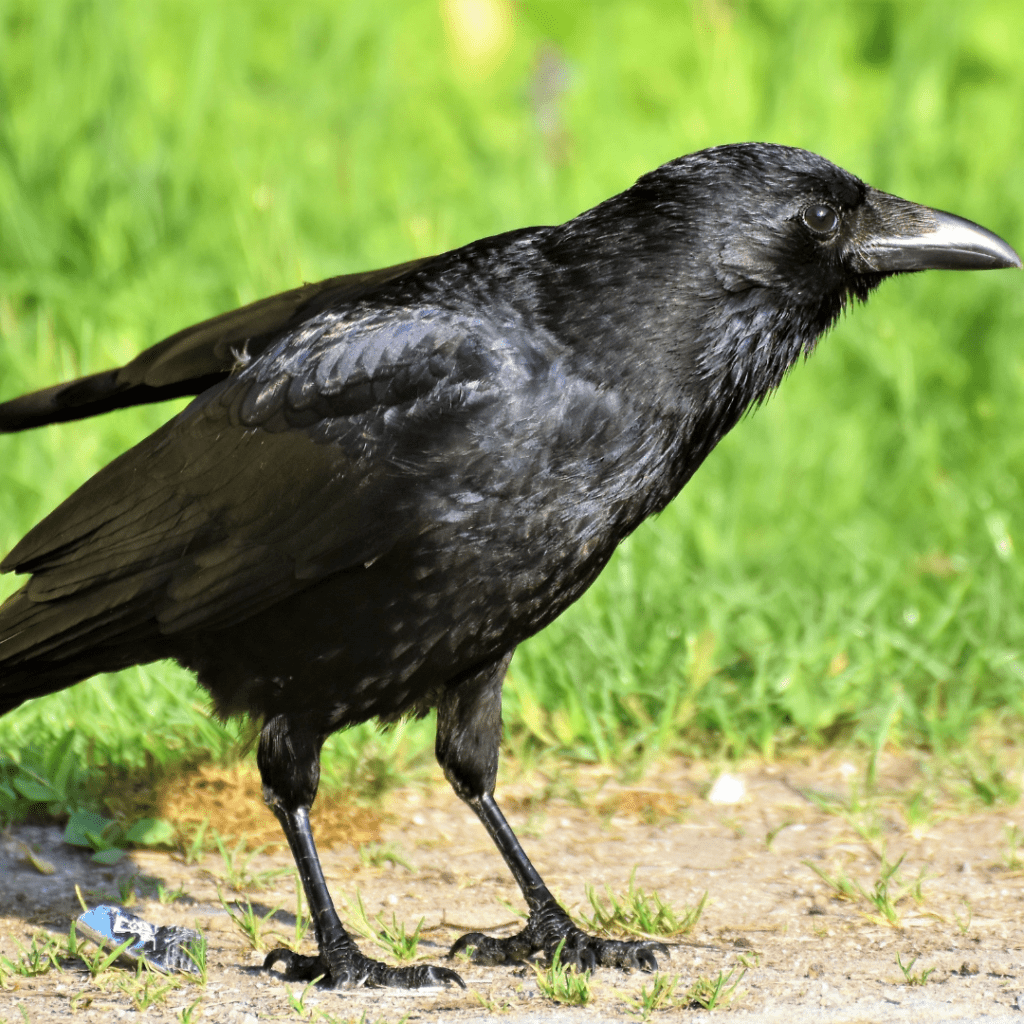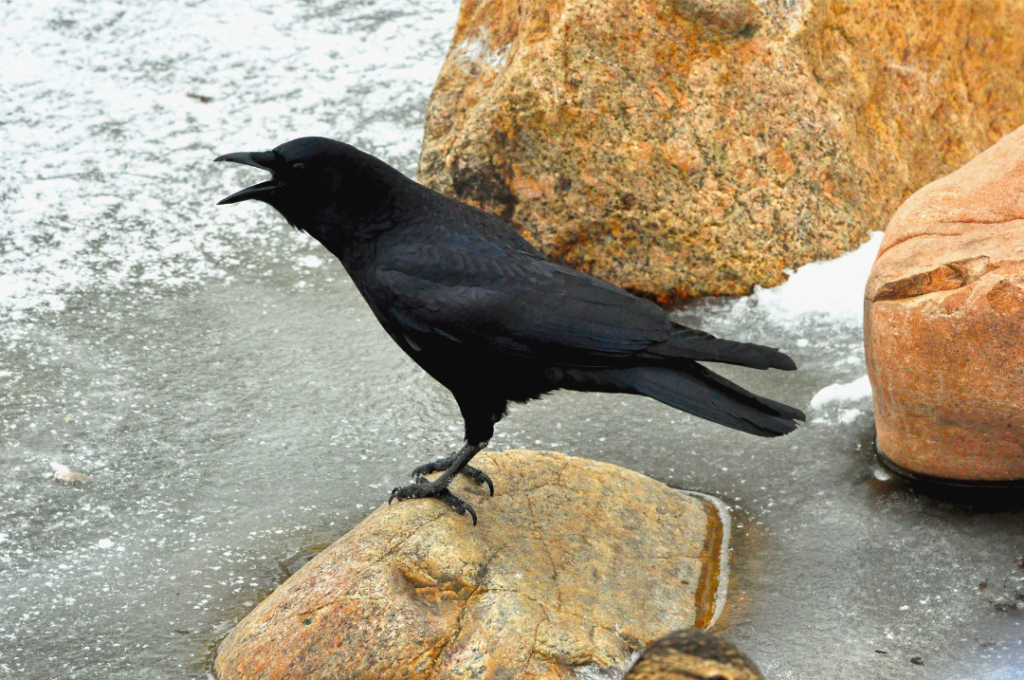Our bond with crows is complex. From ancient folklore to Game of Thrones, crows have occupied plenty of space in the human psyche.
Do crows deserve their fearsome reputations?
Well, crows are among the world’s most clever animals and they don’t back down from a challenge.
They’re fiercely territorial. If you take the wrong step and get too close to a crow’s nest, you just might find yourself playing defense against an angry parent.

Do Crows Attack People?
Throughout time, crows have been respected and studied, but not trusted.
They’re intelligent and bold—animal traits that tend to make folks ill at ease. Throw in that jet black color, those haunting caws, and their taste for rotting flesh, and it’s no surprise that crows are a go-to for storytellers in need of a dark omen.
Perhaps what’s really unnerving about crows is the obvious way that they watch us.
Passing by a group of crows, or catching one’s gaze, it’s clear that they’re sizing us up. Research backs up our suspicions—crows have demonstrated the ability to recognize faces and adjust their behavior towards different people in their environment.
They even make human friends… and hold grudges.
But would a crow—or, worse yet, a group of crows—attack a person?
Yes, crows are willing to take a shot at just about anything or anyone. A territorial crow won’t think twice before swooping toward you in an extremely unfriendly manner.
While you’re unlikely to actually receive a direct hit, chances are you’ll scamper off defeated before your attacker decides to take things up a notch.
Are Crows Aggressive?

Crows are in the Corvidae family of the Passeriformes (perching birds) order.
For casual birders, familiar corvids (members of the Corvidae family) include:
- Crows
- Ravens
- Jays
- Magpies
The Corvidae family has what’s known as a cosmopolitan distribution, meaning that corvids are found all over the world where habitat conditions are fitting. Crows, in particular, are highly adaptable to human-filled settings. They thrive in cities, suburbs, and rural areas.
The American Crow is found year-round in nearly the entire United States.
Crows, along with the entire Corvidae family, are also known for extremely high intelligence.
Superior brainpower brings confidence. Let’s visit a few situations in which crows display impressive toughness and aggression.
Crow Hunting and Feeding
Crows are opportunistic omnivores. They enjoy the songbird staples, like seeds and worms. However, they’re also unable to resist some tasty roadkill, despite the safety risks that come with highway dining.
Live prey is also on the menu. While mammals are too big to be practical snacks on a regular basis, hungry and curious crows take what comes their way. It’s not unheard of for crows to attack large prey like rats or squirrels.
Shockingly, crows are even known to attack livestock. There have been horrifying reports of crows attacking mother and baby sheep during the birthing process, fatally maiming lambs the moment they first see daylight.
Mobbing and Territory Defense
Mobbing is an attack in which members of a weaker species team up to harras and chase off a predator. Birds like jays, mockingbirds, gulls, and blackbirds all engage in mobbing.
Crows are especially bold mobbers. Their targets are often red-tailed hawks or other birds of prey that fly or perch uncomfortably close to nesting areas. Mobbing crows surround their enemy, dive-bombing, cawing, and flying all around until a retreat is forced.
Why Would a Crow Attack a Person?
Mobbing and similar one-on-one attacks are typically carried out in the name of territory defense. Like all birds, crows don’t want anyone getting close to their nest, their eggs, or their babies.
Humans don’t get a free pass. Get too close, you might get mobbed.
A territorial crow may swoop down on you repeatedly until you get out of town. Most dives will buzz past you at a near distance, but a particularly aggressive crow might actually strike you with its head or body.
How to Avoid or Respond to an Aggressive Crow
Crows are fairly territorial year-round. Many crows are non-migratory—home is home.
Their super intelligence also involves incredible environmental awareness that may foster a more prideful, aggressive, and ongoing form of territorialism.
However, crows are more mellow in winter. During this time, they’re typically roosting in large, non-competitive groups. They aren’t nesting, mating, or raising young. So, they have less reason to get defensive about a piece of land.
Around early March, crows start building nests. From then until the end of nesting season, crows have something to protect. First, just a nest. Then eggs, then babies.
Until nesting season ends sometime in mid-summer, crows are on guard.
If your local crows seem a bit edgy, just give them space. Don’t approach nests or babies. If your presence seems to bother them, walk the other way.
Don’t strike back at an angry bird. You might hurt it, provoke it further, or make a vengeful enemy who never forgets your face.
Most “attacks” are really just warning shots. The aggression ends once you start moving in the other direction.
If you’re really worried, what can you do? Try carrying an umbrella. Under an umbrella, you’re well-defended against aerial attacks.
Keeping the Peace With Your Local Crows
Did we scare you? Oops, that wasn’t the goal. Crows are birds, and birds are friends.
Sure, they caw ominously, seem to look straight through our souls, and occasionally peck the eyes out of helpless mammals. That’s all just part of the corvid package.
Crows are incredible creatures, worthy of our admiration. Just remember not to get too close.

Kelly is an environmental science writer, naturalist, and birdwatcher. Kelly holds a master’s degree in environmental policy and has worked as an environmental analyst, urban planner, and professor of environmental planning.
